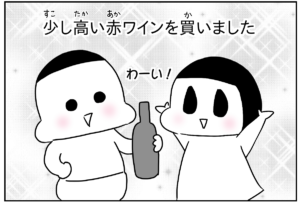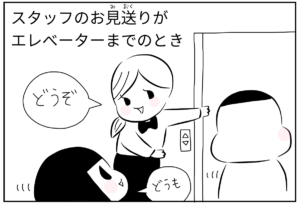Let’s learn Japanese with our funny and laid-back manga blog (yonkoma manga), “Goma Is Clumsy”.
CONTENTS
Manga Blog (Japanese Version)

Vocabulary & Grammar
- ドジ – clumsy, uncoordinated
- うちの – our
- マンション – apartment
- 入り口 – entrance
- ドア – door
- ガラス – glass
- 〜でできている – made of …
- ある日 – one day
- 散歩 – walking
- 〜のあと – after …
- ゴンッ – onomatopoeia for bumping into a hard object
- 〜が見えない – cannot see …
- 思いっきり – fully, hard
- 頭をぶつける – to hit one’s head
- ボーゼン(ぼう然) – stunned, shocked
- 大丈夫 – ok, fine
- それ以来 – since then
- 慎重に – carefully
- 確認する – to check, confirm
- 開いてる – be open
- そ〜っ – onomatopoeia for moving in a careful and cautious way
Manga Blog (English Version)

Comment from the Author
けっこう大きい「ゴンッ」でした。
It was quite a big “BUMP!”.
RELATED LINKS
Support Easy Peasy Japanesey
If you enjoy our content, please consider supporting Easy Peasy Japanesey. Your support will help keep us going. Thanks for all your support!



Anzu-san, if you can find any time to answer between playing with ごま and managing お茶, I have another question to ask.
Why does this sentence 「ガラスのドアが見えなくて思いっきり頭をぶつけたごま」end with 「ごま」. Could the same sentence start with 「ごまは」? If so how would the tone of the sentences differ?
Good question again, Chris-san!
It’s a writing technique called 体言止め (ending a sentence with a noun). It’s used to make the writing more compact, to add a different rhythm in the writing or to get the reader’s attention. In my case, if 体言止め is not used:
うちのマンションの入り口のドアはガラスでできています。
ある日、散歩のあと、ごまはガラスのドアが見えなくて思いっきり頭をぶつけました。
それ以来、慎重に確認しています。
All the sentences end with ます form which is repetitive. So I used 体言止め to add a different rhythm. It also implies that another statement about ごま will follow, which can draw the reader’s attention.
Thank you for such a clear and detailed explanation, you are a very good teacher Anzu-sensei. I can see now of how crucial that subtle difference is to a smooth reading of the text. It is so exciting to step away from the hard work of tackling grammar and kanji, and to begin to consider the importance of the rhythm of language.
Thank you for such a clear and detailed explanation, you are a very good teacher Anzu-sensei. I can see now how crucial that subtle difference is to a smooth reading of the text. It is so exciting to step away from the hard work of tackling grammar and kanji, and to begin to consider the importance of the rhythm of language.